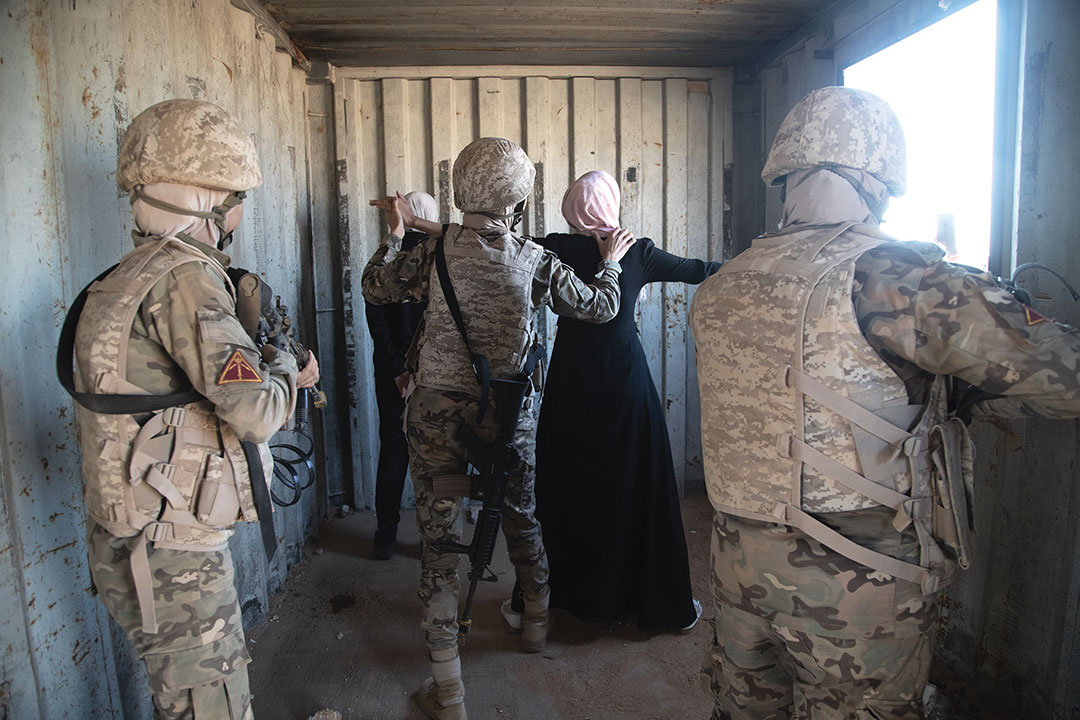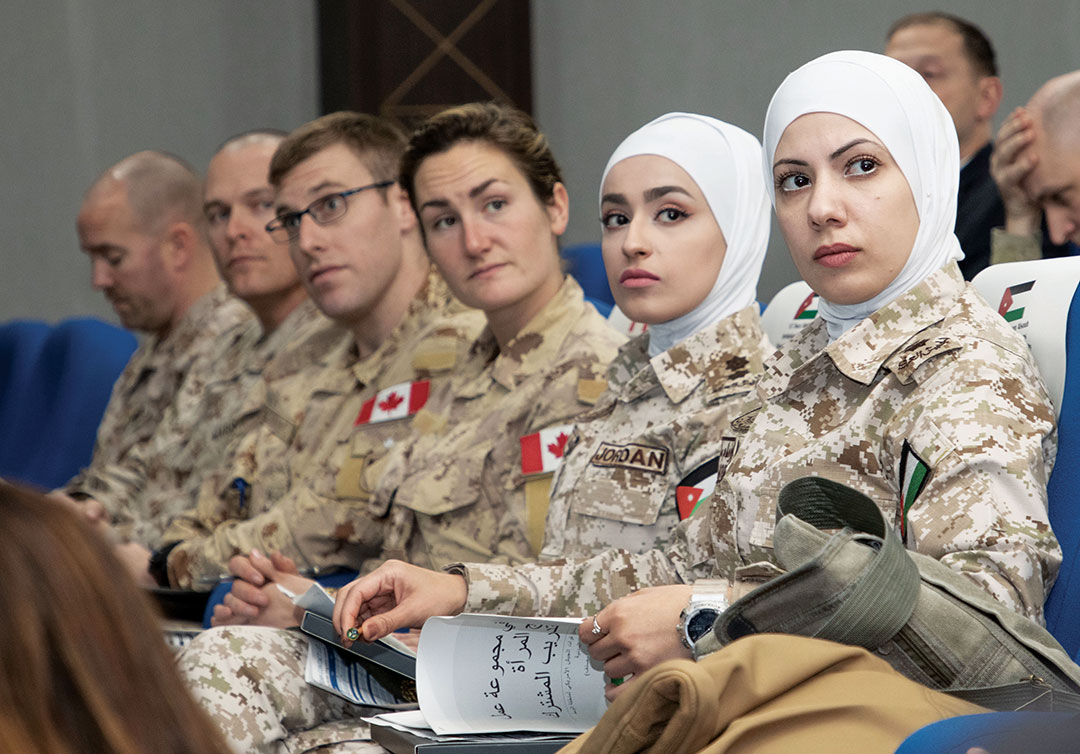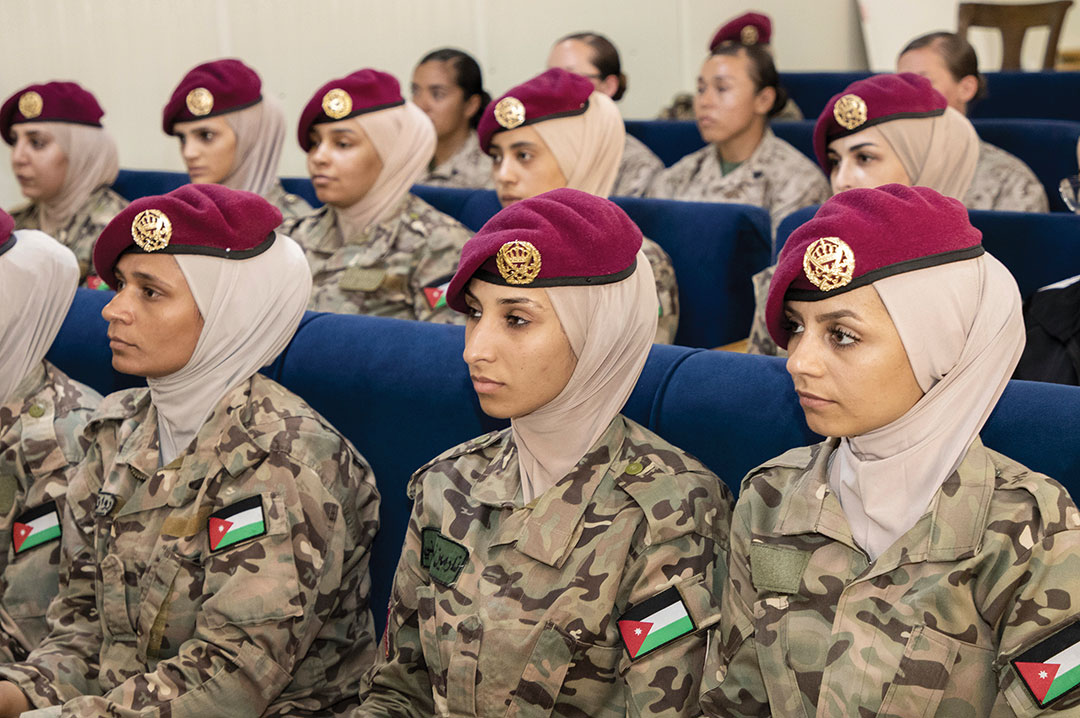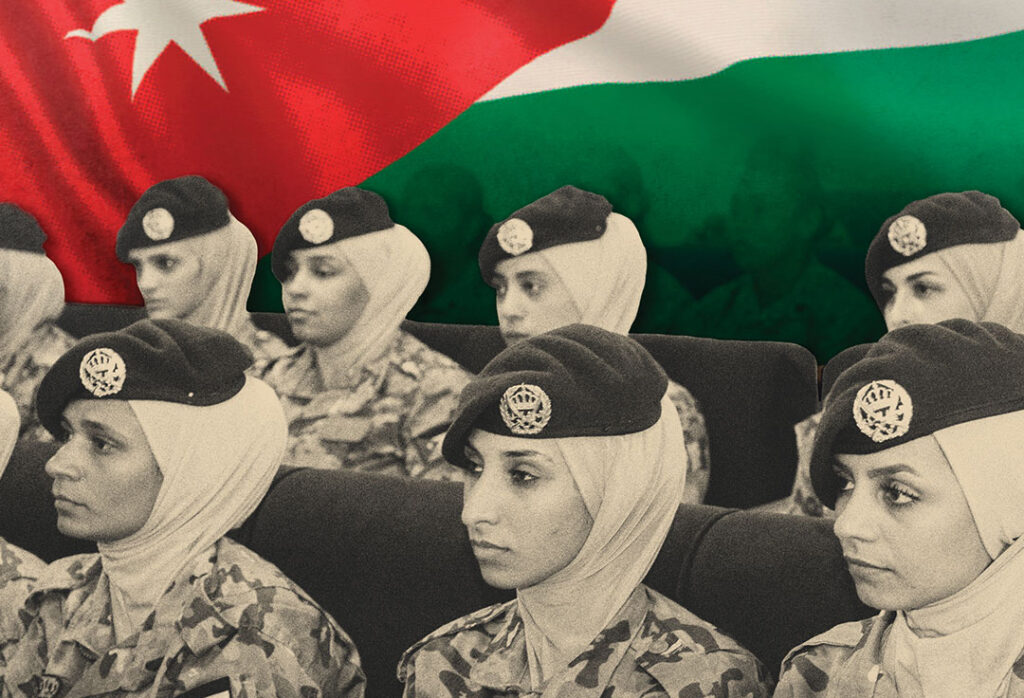Jordan takes the lead in the Middle East in recruiting women for combat-related roles
ARCENT’s Civil Liaison Team in Jordan
Photos by SGT. 1ST CLASS SHAIYLA HAKEEM/U.S. ARMY
One of the international successes of the Jordan Armed Forces was its peace and stability mission to Afghanistan as part of the International Security Assistance Force. And one of the mainstays of that mission were female engagement teams, Jordanian Soldiers whose specialization was dealing with women and children in Afghan villages vulnerable to terrorist recruitment.
The presence of Jordanian women as Soldiers, police officers and civil defense personnel has not been limited to Afghanistan. They have also served in Darfur, Democratic Republic of the Congo and South Sudan in small numbers. Thousands more Jordanian women want to participate in such critical missions but have been constrained by lack of resources in recruitment, training and housing.
The Jordanian leadership, with help from the country’s international partners, is determined to change that with the 2020 opening of the Jordan Military Women’s Center in Amman. The national center, which includes barracks and a parade ground, was built with donations of nearly 4 million euros from Jordan’s European NATO partners.

In line with the goals of United Nations Security Council Resolution 1325 on Women, Peace and Security, Jordan’s Armed Forces, Gendarmerie Directorate and Civil Defense Directorate aim to increase female enlistment in field positions to 3%. An expansion of the ranks, roles and responsibilities of women in the country’s security forces is enshrined in a Jordanian National Action Plan for the years 2018 to 2021.
I have had the honor, as part of U.S. Army Central’s Civil Liaison Team in Jordan, to organize and host a Gender Integration Working Group with my military sisters from Jordan in January 2020. After working with Jordanian officers and noncommissioned officers, I’ve observed their dedication up close and realize more than ever that women are essential to the success of militaries around the world.
Jordan has long recognized the need for broader women’s participation in the security sector, but female contributions have been concentrated in nursing and clerical positions. Women jumped at the chance to join the military after the establishment of the Princess Mona College of Nursing in 1962, and today most of the 10,000 female Soldiers in Jordan serve in a medical field.
In 1995, His Majesty King Hussein bin Talal created what would become the Directorate of Women’s Military Affairs with the encouragement of his daughter Her Royal Highness Princess Aisha bint Al Hussein, a high-ranking military officer. The directorate is dedicated to advancing women in the Armed Forces through recruitment and training.
Col. Maha Al-Nasser runs that directorate today and, with the opening of the Jordan Women’s Military Center, is sifting through more than 14,000 applications from young women interested in pursuing military careers. In her own 30-year military career, Col. Maha has been a pioneer for integrating women as equal partners into the Jordan Armed Forces.

I want to stress that female recruitment to the Armed Forces, the police and gendarmerie and the civil defense directorate isn’t an exercise in increasing numbers for the sake of increasing numbers. The Jordan Armed Forces, with only 1.4% of its field and combat-related positions occupied by women, recognizes it needs greater female participation to accomplish its many missions.
Jordan has felt that dearth of qualified female troops in the past two decades. It wasn’t just the missions in Afghanistan and Africa where women were needed on the ground in numbers beyond what Jordan could supply. As hundreds of thousands of Syrian women and children flooded Jordan’s borders during the Syrian civil war, far too few female troops were available to handle the humanitarian crisis. A similar problem occurred with an influx of Iraqi refugees in the preceding decades.
In 2017, the Jordan Armed Forces formed a platoon-size female engagement team as part of its highly trained Quick Reaction Force. It was the first of its kind in Jordan and the Middle East. Jordanian commanders can attach engagement team members to other units to respond to a broad spectrum of conflicts.
It’s a fact of life that gender-sensitive missions require highly trained female units. For example, in 2005, an Iraqi female terrorist wearing an explosive belt approached Amman’s Radisson SAS hotel with the intention of blowing it up. The presence of female guards to perform a body search might have helped avoid the tragedy.

Jordan’s Gendarmerie Directorate — tasked largely with providing security at public events and conducting domestic counterterrorism investigations — is also trying to boost female recruitment. According to a study conducted by the Gendarmerie forces, the directorate would benefit from further female recruitment to provide stadium security and riot control and handle detainees and refugees.
When the Gendarmerie sent forces on United Nations peacekeeping missions to Darfur and South Sudan, only three women participated in each operation, despite the need to deal with thousands of African women and children.
The Gendarmerie’s leadership has enlisted German, Swedish and Canadian trainers to help with widening the skills of female enlistees.
The Jordanian Civil Defense Directorate is feeling a similar need to diversify its recruitment. Women are underrepresented in civil defense and are completely absent in the fields of firefighting and search and rescue. Among the directorate’s recruitment goals is to hire women to work on hazardous materials and chemical disinfection teams.
The Jordanian security sector is making great strides in providing career opportunities to the country’s vast pool of talented and educated women. As military officers, we are responsible for maintaining an upper hand to defend our nations, and that includes using all available talent at hand.
It’s been one of the highlights of my 18-year career in the U.S. Army to have contributed in a small way to the advancement of military women in Jordan.

